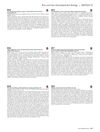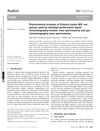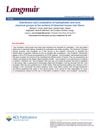 November 2024 in “Applied Sciences”
November 2024 in “Applied Sciences” Wild strawberry waste extract can be a sustainable cosmetic ingredient for treating acne and hair loss.

Water and fatty acids affect hair's surface differently based on hair damage, and models can help understand hair-cosmetic interactions.
[object Object]  40 citations,
June 2011 in “Journal of biological chemistry/The Journal of biological chemistry”
40 citations,
June 2011 in “Journal of biological chemistry/The Journal of biological chemistry” FA2H is essential for normal fur and sebum production in mice.
 19 citations,
November 2018 in “Nutrients”
19 citations,
November 2018 in “Nutrients” Annurca apple extract may protect mouse hair from damage by chemotherapy and could help treat hair loss without promoting cancer growth.
 February 2022 in “International journal of KIU”
February 2022 in “International journal of KIU” Certain genes and nutrients like vitamin D, zinc, and omega fatty acids affect COVID-19 severity and infection risk.
 6 citations,
December 2022 in “Cell reports”
6 citations,
December 2022 in “Cell reports” Eating a high-fat fish oil diet caused mice to lose hair due to a specific immune cell activity in the skin linked to a protein called E-FABP.
9 citations,
June 2020 in “Cell stem cell” Skinny fat cells help wounds heal faster by releasing fatty acids.
 1 citations,
April 2023 in “Frontiers in Immunology”
1 citations,
April 2023 in “Frontiers in Immunology” New treatments for hair loss from alopecia areata may include targeting immune cells, using stem cells, balancing gut bacteria, applying fatty acids, and using JAK inhibitors.
 December 2022 in “Türk biyokimya dergisi”
December 2022 in “Türk biyokimya dergisi” The conclusions are: fecal short-chain fatty acids may help prevent cancer, fiber intake can reduce obesity, weight loss is hard for obese people, low BMI cancer patients are more prone to chemotherapy side effects, intermittent fasting benefits gut health, cherry laurel has health benefits in rats, certain gene variations can increase stress in hair loss patients, fecal acids can affect blood sugar levels, cold agglutinin can affect blood test results in autoimmune patients, and people with Crohn's disease have higher levels of a certain chemical in their blood.
 27 citations,
July 2018 in “Experimental dermatology”
27 citations,
July 2018 in “Experimental dermatology” Autophagy is crucial for normal sebaceous gland function and sebum composition.
 April 2017 in “Journal of Investigative Dermatology”
April 2017 in “Journal of Investigative Dermatology” Deleting the CRIF1 gene in mice disrupts skin and hair formation, certain proteins affect hair growth, a new compound may improve skin and hair health, blood cell-derived stem cells can create skin-like structures, and hair follicle stem cells come from embryonic cells needing specific signals for development.
 47 citations,
June 2012 in “Genes & Development”
47 citations,
June 2012 in “Genes & Development” A mother's western diet can make her milk toxic, causing inflammation and hair loss in babies.
 38 citations,
January 2013 in “Analyst”
38 citations,
January 2013 in “Analyst” The study found that Ziziphus jujuba seeds contain beneficial compounds for treating insomnia and anxiety and that the methods used are effective for assessing their quality.
 22 citations,
August 2011 in “Journal of Supercritical Fluids”
22 citations,
August 2011 in “Journal of Supercritical Fluids” Rice bran extract might help prevent hair loss.
 September 2016 in “Journal of Dermatological Science”
September 2016 in “Journal of Dermatological Science” A gene mutation worsens skin irritation in mice due to a lack of certain fats.
 119 citations,
January 2012 in “Nutrition & Metabolism”
119 citations,
January 2012 in “Nutrition & Metabolism” Modern lifestyles, including poor diet, stress, and long-term use of certain medications, hinder the body's ability to heal from inflammation, leading to chronic diseases.
 67 citations,
February 2020 in “Journal of Ginseng Research”
67 citations,
February 2020 in “Journal of Ginseng Research” Korean Red Ginseng has beneficial components that help with stress, immunity, fatigue, memory, blood flow, and disease protection.
[object Object]  17 citations,
July 2019 in “Scientific reports”
17 citations,
July 2019 in “Scientific reports” Surface and internal treatments can help prevent hair lipid loss during washing.
 June 2023 in “Journal of Ayurvedic and herbal medicine”
June 2023 in “Journal of Ayurvedic and herbal medicine” Pumpkin seeds may improve health due to their rich nutrients and potential to treat various conditions.
 January 2017 in “Springer eBooks”
January 2017 in “Springer eBooks” Eating a balanced diet with specific nutrients can help manage menopause symptoms and prevent related health issues.

Some plant-based ingredients may help with hair growth and care, but more research is needed to confirm their effectiveness.
 91 citations,
April 2017 in “Diabetes & Metabolic Syndrome: Clinical Research and Reviews”
91 citations,
April 2017 in “Diabetes & Metabolic Syndrome: Clinical Research and Reviews” Eating fewer calories, less sugar and refined carbs, and more low-glycemic and omega-3 rich foods can help manage PCOS symptoms.
 38 citations,
January 2015 in “Journal of Cosmetic Dermatology”
38 citations,
January 2015 in “Journal of Cosmetic Dermatology” The nutritional supplement improved hair density and reduced hair loss in women with female pattern hair loss.
 36 citations,
October 2014 in “Langmuir”
36 citations,
October 2014 in “Langmuir” Bleaching hair removes its protective top layer and exposes more hydrophilic groups, changing its chemical surface and affecting how it interacts with products.
 8 citations,
May 2017 in “Current traditional medicine”
8 citations,
May 2017 in “Current traditional medicine” Stinging nettle has compounds that help with joint pain, arthritis, and prostate issues.
 4 citations,
October 2022 in “Frontiers in public health”
4 citations,
October 2022 in “Frontiers in public health” Cadmium chloride pollution can cause skin disorders, speed up aging, and prevent hair growth.
 1 citations,
December 2021 in “Pakistan biomedical journal”
1 citations,
December 2021 in “Pakistan biomedical journal” Eating certain seeds may help reduce symptoms of Polycystic Ovary Syndrome.
 March 2024 in “Revista Agraria Academica”
March 2024 in “Revista Agraria Academica” The Mediterranean dwarf palm has medicinal, nutritional, and craft uses, but more research is needed.

Henna has many medicinal uses but needs more research to confirm its benefits.
 138 citations,
July 2015 in “Clinical, Cosmetic and Investigational Dermatology”
138 citations,
July 2015 in “Clinical, Cosmetic and Investigational Dermatology” Eating less sugar, milk, and saturated fats and more vegetables and fish may help treat and prevent acne.




























